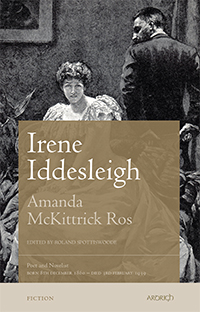What's All This Then?
Ardrigh Books

Amanda mckittrick ros
Irene Iddesleigh
edited by Roland Spottiswoode
£12.00, May 2014
ISBN 978-1-909721-00-5
3 b/w illus.; pp. xlii, 226 PB
Fiction, Irish fiction, Irish studies
Irene Iddesleigh, the lovely ward of an aristocratic family, seems destined for a conventional society marriage, but in this celebrated romance of upper class life, first published in Belfast in 1897, her destructive secret passion for a past love is uncovered in a plot involving ungovernable jealousy, bigamy and suicide. With this book Amanda McKittrick Ros won an international reputation as one of the most original writers of her generation. Admirers of her exuberant prose style included Mark Twain, Ronald Firbank and C.S.Lewis. This is the first edited edition to be published since 1927, uniquely containing the notorious critiques by Barry Pain and Thomas Beer along with Amanda’s own withering replies.
‘Amanda is the most perfect instrument for measuring the sense of humour. Alert and quick witted people accept her at once: those she leaves entirely unmoved are invariably dull and unimaginative.’
Jack Loudan, Oh Rare Amanda.
‘Mrs. Ros would have many more devotees were it not for the difficulty of acquiring her books. I even know of a copy of Delina Delaney having been purloined from his host’s shelves by a Prime Minister who refused to give it up.’
E.V. Lucas, Mr. Ingleside.
‘I read some years ago the works of your latest discovery Amanda Ros . . . . She has quite a streak of something like genius.’
Herbert Henry Asquith, Lord Oxford, Letters to a Friend.
‘[Irene Iddesleigh] is written throughout in a vein of utmost magnificence before which Lyly, Bulwer [Lytton], Disraeli and even Ouida pale their ineffectual fires.’
James Agate.
‘She partakes….of the Shakspearean power over language.’
Anthony Powell.
‘Too great an innovation in English literature to prevent the decadent and degenerate present day tendencies towards festering unreality.’
Walter Shanks.
 BUY FROM AMAZON
BUY FROM AMAZON